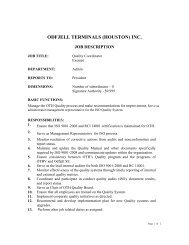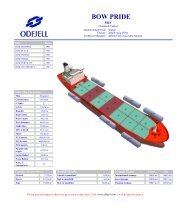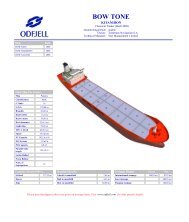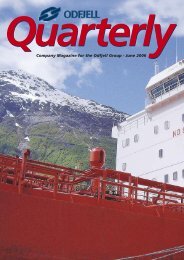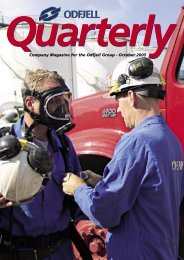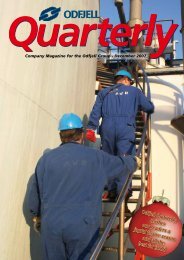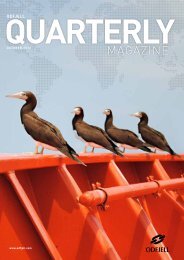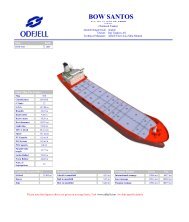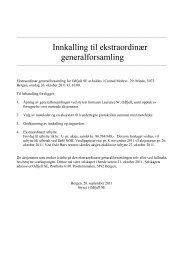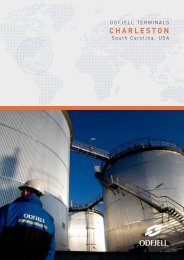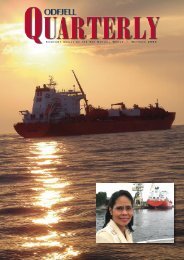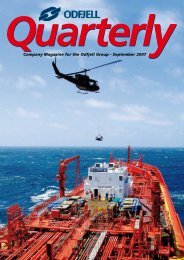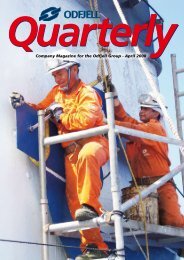Company Magazine for the Odfjell Group - March 2005
Company Magazine for the Odfjell Group - March 2005
Company Magazine for the Odfjell Group - March 2005
- No tags were found...
You also want an ePaper? Increase the reach of your titles
YUMPU automatically turns print PDFs into web optimized ePapers that Google loves.
Safety Bulletin<br />
Our LTIF is up<br />
By Toralf Sørenes<br />
After three years of steady improvement,<br />
<strong>the</strong> Lost Time Injury Frequency<br />
(LTIF) is increasing again and <strong>the</strong> 2004<br />
figure is above both <strong>the</strong> 2002 and 2003<br />
numbers. The LTIF is one, if not <strong>the</strong><br />
most important safety per<strong>for</strong>mance<br />
indi-cator, and <strong>the</strong> shift certainly gives<br />
cause <strong>for</strong> concern. LTIF is an international<br />
and well-recognised indicator showing<br />
<strong>the</strong> number of cases where at<br />
least one man-day is lost due to accidents<br />
per million working hours. On<br />
<strong>the</strong> ships we count 24 hours of work<br />
per day, but if more than one man-day<br />
is lost, it still only counts <strong>for</strong> one case.<br />
The below graph speaks <strong>for</strong> itself, and<br />
we will not go into fur<strong>the</strong>r details here.<br />
However, we will certainly look thoroughly<br />
into <strong>the</strong> underlying issues with<br />
<strong>the</strong> objective of finding measures we<br />
Industry work group –<br />
Chemical tanker explosions<br />
The unusual high number of explosions<br />
on chemical tankers during <strong>the</strong> last few<br />
years has caused significant concern<br />
throughout our segment of <strong>the</strong> shipping<br />
industry, from <strong>the</strong> top-level regulators<br />
in IMO to <strong>the</strong> crew on board.<br />
Tank cleaning has been ongoing in<br />
several of <strong>the</strong> accidents, and as we<br />
know, two ships on <strong>the</strong> list are <strong>Odfjell</strong><br />
vessels.<br />
In an attempt to find common denominators<br />
and implement effective corrective<br />
measures, an Industry work group<br />
has been established. The group consists<br />
of <strong>the</strong> major stakeholders in <strong>the</strong><br />
industry and includes oil companies<br />
through OCIMF, chemical companies<br />
through CEFIC, ship owners through<br />
ICS, tanker owners through Intertanko<br />
and parcel tanker owners through<br />
IPTA. In addition classification societies<br />
can implement to reverse <strong>the</strong> negative<br />
trend. In <strong>the</strong> meantime we will urge<br />
everybody on all levels to stay focused<br />
on safety and make a joint ef<strong>for</strong>t to get<br />
<strong>the</strong> LTIF back on track.<br />
<strong>Odfjell</strong> Lost Time Injury Frequency<br />
1999-2004<br />
are represented in <strong>the</strong> work group<br />
through IACS. The structure is a steering<br />
committee on top, consisting of<br />
<strong>the</strong> heads of above organizations, a<br />
working group and finally several task<br />
groups. Svend Foyn-Bruun and Toralf<br />
Sørenes represent <strong>Odfjell</strong> in one of <strong>the</strong><br />
task groups. The objective of <strong>the</strong> initiative<br />
is to give an “agreed” industry<br />
advice to IMO and <strong>the</strong> industry within<br />
4-6 months. Improved principles <strong>for</strong><br />
cleaning after carrying flammable<br />
products are included in <strong>Odfjell</strong>'s<br />
revised procedures. It remains to be<br />
seen if <strong>the</strong>se principles will become one<br />
of <strong>the</strong> advices from <strong>the</strong> work group, at<br />
least shorter-term. Ano<strong>the</strong>r central<br />
issue is compliance with rules and<br />
guidance, and also in this respect we<br />
are well under way with our new<br />
marine superintendents in place.<br />
Customer Inspections & Vettings – News<br />
Renewal of P&I<br />
Insurance <strong>2005</strong><br />
On 20 February <strong>2005</strong> our P&I insurances<br />
were renewed. This includes all ships<br />
that <strong>Odfjell</strong> operates, whe<strong>the</strong>r owned,<br />
time chartered or used as feeder ships<br />
on short hauls. Although we have suffered<br />
two major accidents since last<br />
renewal, cargo and crew claims have<br />
improved and we have subsequently<br />
managed to renew our P&I insurance<br />
on a very satisfactory level also this<br />
year. It is important to appreciate that<br />
in addition to being a cost, insurance<br />
premiums are a very important per<strong>for</strong>mance<br />
indicator towards our customers<br />
and <strong>the</strong> environment in which we do<br />
our business. Our clubs, Gard in<br />
Arendal and Britannia in London are<br />
both per<strong>for</strong>ming well service-wise and<br />
<strong>the</strong>y are strongly funded. No ships were<br />
<strong>the</strong>re<strong>for</strong>e transferred between clubs at<br />
this renewal.<br />
An <strong>Odfjell</strong> ship in a Norwegian fjord,<br />
not <strong>the</strong> most common sight.<br />
OCIMF has recently introduced a new<br />
scheme called Tanker Management and<br />
Self Assessment, in short TMSA. Meant<br />
as a complement to ISM, it is designed<br />
to enhance self-regulation and to help<br />
ship operators measure and improve<br />
<strong>the</strong>ir management systems. Keywords<br />
in <strong>the</strong> system are Best Practice, Key<br />
Per<strong>for</strong>mance Indicators or KPIs and<br />
continuous improvement. There are<br />
clear indications that many customers<br />
will make use of <strong>the</strong> system mandatory<br />
in <strong>the</strong> near future. This may shift some<br />
focus from ships to management<br />
systems and it will become more important<br />
that <strong>the</strong> ship is “inspection ready”<br />
at <strong>the</strong> time of an inspection. Lengthy<br />
exchanges to clear out negative observations<br />
could well become a thing of<br />
<strong>the</strong> past which in turn will increase <strong>the</strong><br />
importance of close and effective<br />
superintendence by ship managers.<br />
20 ODFJELL Quarterly <strong>March</strong> <strong>2005</strong>




